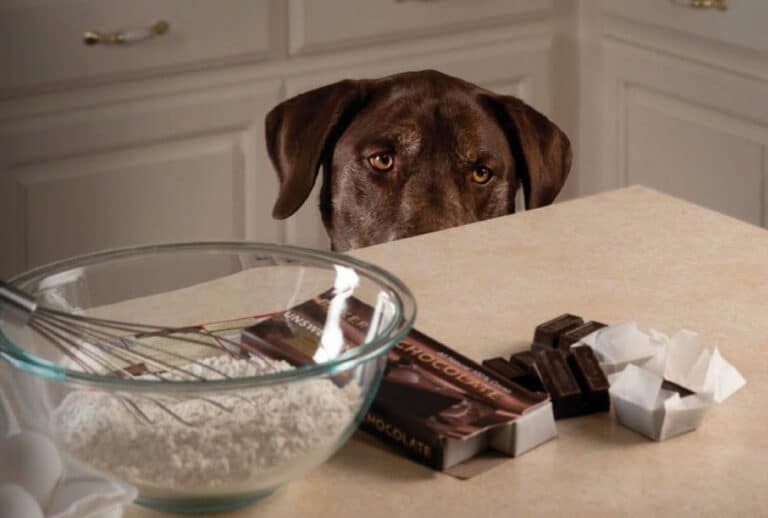This is a delicious snack for us, but then you may ask yourself: “Is chocolate toxic to dogs?”
Chocolate toxicity is a common problem in dogs and often results from accidental ingestion. The level of toxicity for this food depends on its type (the higher the cocoa concentration, the more is chocolate toxic to dogs) and how much the dog ate, and how big the dog was.
Let’s take a closer look at what happens if a dog eats this aliment and what you should do.
CONTENT:
- What if my dog eats chocolate?
- Treatment for chocolate poisoning
- What should I do if my dog eats chocolate?
- How do I prevent my dog from eating chocolate?
- The answer to the question “Is chocolate toxic to dogs?”
What if my dog eats chocolate?
The answer to the question “Is chocolate toxic to dogs?” depends on the size of your dog and how much chocolate he has consumed.
If you have a medium to large dog that consumes only a small amount of it, then you may only notice signs associated with a small number of stomach discomforts, such as vomiting or diarrhea.
Signs of poisoning with that food usually appear within 6 to 12 hours after the dog has eaten it. There are cases where the signs can last up to 72 hours and include the following:
- Vomiting
- Diarrhea
- Restlessness
- Increased urination
- Shaking
- Increased or abnormal heart rate
- Seizures
- Collapse and death
Very important: older dogs and dogs with heart disease are more at risk of sudden death due to chocolate poisoning.
Treatment for chocolate poisoning
The treatment for chocolate poisoning is primarily to remove it from your dog’s body. If the food has been consumed in the last hour, the veterinarian may cause vomiting to remove it from the body and thus avoid hospitalization.
It is important to note that you should not try to induce vomiting in your dog without the supervision of a veterinarian. If more than a few hours have passed or you do not know when the food was consumed, your veterinarian may try to help clean the toxic byproducts of chocolate from the dog’s system by administering activated charcoal or intravenous fluids. If your dog shows no signs of chocolate toxicity, this may be all the treatment he needs.
Don’t forget that even a small piece of chocolate can be very toxic to dogs!
What should I do if my dog eats chocolate?
If you suspect that your dog has eaten it or you see it eating that food, do not wait to see if it develops the signs of toxicity shown in the previous point. Call your veterinarian immediately. The earlier it is treated, the more likely it is to recover without incident.
It is useful to keep or take a picture of the packaging of chocolate consumed by your dog so that you can offer it to your veterinarian, as the treatment often differs depending on the type of food ingested, the amount of chocolate ingested by your dog, how long it has been since your dog ate it.
How do I prevent my dog from eating chocolate?
Even though small amounts of milk chocolate may not be a problem for older dogs, it is not recommended for the owner to give that food to your dog as a reward. To prevent your dog from eating it, follow these tips:
- Put it in a place inaccessible to him: make sure all chocolate items, including cocoa powder, are stored where the dog can’t reach them, such as on a high shelf in a pantry with the doors closed.
- Teach the dog to listen to the “leave it” command. This command is extremely effective in preventing him from eating anything that is not suitable for him. It is also a very easy command to learn.
- Train your dog. This is the safest way to make sure that your four-legged friend does not eat anything harmful while you are not watching him.
So keep all chocolate away from your dog. Most cases of chocolate poisoning are around the holidays. This food, even in small quantities, is never a good treat for a dog. Instead, you can give your dog delicious and safe rewards, which will surely delight him even if he is picky about food.
The answer to the question “Is chocolate toxic to dogs?”
Chocolate is toxic to dogs because it contains theobromine and, to a lesser extent, caffeine. People metabolize theobromine easily, but dogs do not. Dogs slowly process theobromine and caffeine, which allows these toxic compounds to build up in their systems and cause clinical signs associated with chocolate toxicity.
However, when it comes to toxicity, not all chocolate is the same. Toxicity varies depending on the type of chocolate your dog has consumed. Here are some types of chocolate listed in order of the bromine content:
- Cocoa powder (most toxic)
- Unsweetened bakers chocolate
- Semi-sweet chocolate
- Black chocolate
- Milk chocolate

